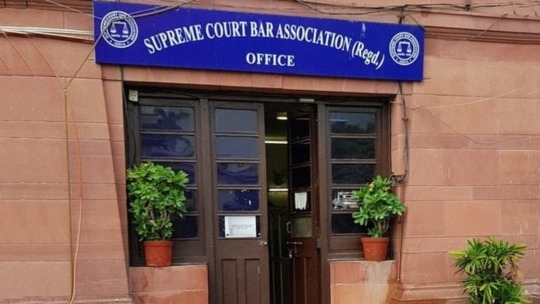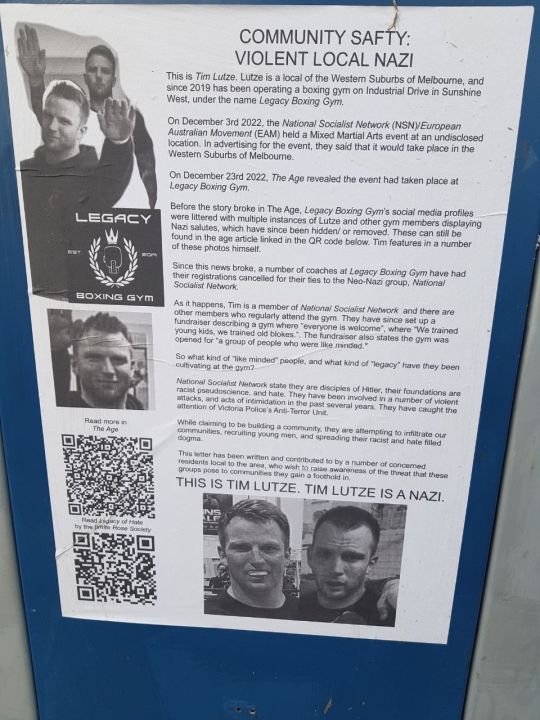#electoral bonds news
Explore tagged Tumblr posts
Text
youtube
#DYChandrachud#CJIChandrachud#supremecourt#CJI DY Chandrachud- Sibal tells CJI-This is Not fair! Sibal tell CJI-This is Not fair!#Kashmiri Lecturer Suspended After Appearing in Supreme Court for Article 370 Hearing.#CJI#CJI Chandrachud News#CJI DY Chandrachud#CJI News#DY Chandrachud#ECI News#Election Commission of India#Electoral Bond#Electoral Bonds News#Mukul Rohatgi#Prashant Bhushan#Supreme Court#Supreme Court News#Tushar Mehta#cji chandrachud#electoral bonds#electoral bonds supreme court#indian street food#इलेक्टोरल बॉन्ड्स#चुनावी चंदा#सुप्रीम कोर्ट#Political pressure#Youtube
0 notes
Text
Electoral Bond: सुप्रीम कोर्ट बार एसोसिएशन ने की अपने अध्यक्ष की निंदा, कहा, पत्र लिखने के लिए नही किया था अधिकृत
Electoral Bond: सुप्रीम कोर्ट बार एसोसिएशन ने की अपने अध्यक्ष की निंदा, कहा, पत्र लिखने के लिए नही किया था अधिकृत
Supreme Court Bar Association: सुप्रीम कोर्ट बार एसोसिएशन (एससीबीए) ने अपने अध्यक्ष आदिश सी. अग्रवाल द्वारा राष्ट्रपति द्रौपदी मुर्मू को लिखे उनके उस पत्र में व्यक्त विचारों की निंदा की है जिसमें उनसे चुनावी बॉण्ड योजना मामले में शीर्ष अदालत के फैसले पर राष्ट्रपति संदर्भ लेने का आग्रह किया गया है। अग्रवाल के विचारों से खुद को अलग करते हुए बार निकाय की कार्यकारी समिति ने 12 मार्च को जारी अपने…

View On WordPress
#bangladesh supreme court bar association#condemned#Electoral Bond#Electoral Bond Scheme#Electoral bonds#electoral bonds case#electoral bonds explained#electoral bonds in india#electoral bonds india#electoral bonds news#electoral bonds scheme#electoral bonds supreme court#electoral bonds upsc#President#sbi electoral bonds#sbi on electoral bonds#sc on electoral bonds#Supreme Court#supreme court bar#Supreme Court Bar Association#supreme court bar association election#supreme court bar association elections#supreme court bar association president#supreme court bar election#supreme court bar election 2023#supreme court election#supreme court electoral bonds#supreme court live#supreme court news#supreme court of india
0 notes
Text
Georgia Democrats trying to block several candidates, including De la Cruz/PSL from ballot
https://www.fox5atlanta.com/news/georgia-democrats-kennedy-jill-stein-presidential-ballot-election
#democrats#republicans#de la cruz#psl#ballotsoftware#ballotcountingsoftware#ballot initiative#mail in ballots#ballot access#absentee ballots#ballots#ballot#usa is a terrorist state#usa news#usa politics#usa#american indian#american#america#amerika#amerikkka#electoral commission#electoralism#electoral politics#electoral bonds#electoral college#fake electors#election 2024#us elections#general election
2 notes
·
View notes
Text

#memes#new memes#alienation#partisan rivalry#neoliberal indifference#neoliberal apathy#indifference#abnormalize indifference#classism#scratch a liberal#erosion of social bonds#class solidarity#gerrymandering#electoral politics#two party system#victim blaming#american south#texas#climate change#natural disaster#mutual aid#solidarity#texas comrades#stand with southern working class#working class solidarity#red states#blue states#democrats are not the good guys#democrats#republicans
0 notes
Text
youtube
Covidshield वैक्सीन का जबरदस्त खुलासा | जान की कोई कीमत नही | #covid19 #covidvaccine #electoralbond
#long covid#covid#coronavirus#coronation day#electoral bonds#politics#indian politics#corona virus#covid safety#world news#breaking news#news#youtube#social media#social media news#vaccine#loksabha election#curruption
0 notes
Text
#breaking news#international news#news#srilanka#srilanka news#srilanka weekly#world news#India’s electoral bonds: Lakshmi Mittal among top buyers
0 notes
Text
Electoral Bonds Case में SBI को कल तक देनी होगी जानकारी; SC का आदेश
नई दिल्ली। Electoral Bonds Case : सुप्रीम कोर्ट की पांच न्यायाधीशों की संविधान पीठ ने भारतीय स्टेट बैंक (SBI) की याचिका को खारिज कर दिया है। सुप्रीम कोर्ट ने SBI से 12 मार्च तक चुनाव आयोग को चुनावी बांड की जानकारी देने को कहा है। इसी के साथ ही सुप्रीम कोर्ट ने चुनाव आयोग को 15 मार्च को शाम 5 बजे तक अपनी आधिकारिक वेबसाइट पर जानकारी पब्लिश करने का निर्देश दिया है। CM in Haldwani : हल्द्वानी में…

View On WordPress
0 notes
Text
Hungarian Prime Minister Viktor Orban, the only EU leader to openly back Donald Trump in his bid to reclaim the White House, was unsurprisingly among the first to congratulate the former president on Wednesday morning, even before the final results were in and rival Kamala Harris had conceded.
“The biggest comeback in US political history! Congratulations to President @realDonaldTrump on his enormous win. A much needed victory for the World!” Orban rejoiced on X (formerly Twitter).
Orban, who will be hosting European leaders in Budapest later this week, was swiftly joined by other illiberal leaders and fellow populists in Central and Southeast Europe, likewise unable to contain their glee at the return of Trump, who by midmorning Europe time had gained 266 electoral votes — just four shy from the 270 he needs to be elected the 47th US president.
Another close ally of Trump in Central Europe, Polish President Andrzej Duda, who met the former president in New York earlier this year, posted excitedly, complete with emojis: “Congratulations, Mr. President @realDonaldTrump! You made it happen! 👏👏👏🇵🇱🤝🇺🇸”.
In the Czech Republic, the former prime minister and Trump admirer Andrej Babis posted on X: “Sensational comeback @realDonaldTrump! He wasn’t stopped by an assassination attempt, nor by politically motivated lawsuits, nor by a systematic smear campaign in the media. American citizens have made it clear who they want as US President. I am confident that his victory will bring prosperity to the United States and peace to the world.”
More subdued comments came from Prime Minister Petr Fiala, who Babis is looking to oust in 2025, also on X: “Congratulations to Donald Trump on winning the presidential election. Our shared goal is to ensure that the relations between our countries remain at the highest level, despite changes in administration, and that we continue to develop them for the benefit of our citizens.”
Populist Slovak prime minister, Robert Fico, is currently on a state visit to China, though his ally, President Peter Pellegrini, offered his congratulations to Donald Trump on X. “I wish you and the American people all the success. Slovakia remains to be a strong and reliable Ally on NATO’s tested Eastern Flank living up to our shared commitments. I sincerely wish for a continuation of our good cooperation. Let’s make the transatlantic bond great again.”
Serbian President Aleksandar Vucic, who visited the White House during Trump’s first term in office that ended in 2020, welcomed Trump’s win on X. “Congratulations to Donald Trump on his victory. Together we face the serious challenges ahead. Serbia is committed to cooperation with the USA on stability, prosperity and peace,” Vucic wrote.
Turkey’s strongman leader, President Recep Tayyip Erdogan, said he wanted to congratulate his “great friend” Trump on his victory.
“In this new period that will begin with the election of the American people, I hope that Turkey-US relations will strengthen, that regional and global crises and wars, especially the Palestinian issue and the Russia-Ukraine war, will come to an end; I believe that more efforts will be made for a more just world,” Erdogan wrote on X.
The first to hail Trump’s win from Bosnia and Herzegovina was, unsurprisingly, the president of the Serb-dominated Republika Srpska entity, Milorad Dodik. “One of [the] most important electoral wins in recent history of the USA but the World as well! Congratulations, Donald Trump, 47th President of the United States of America!” Dodik wrote on his official X profile.
Late last year Dodik said that a victory for Trump would mean a “better geopolitical situation for Republika Srpska”, claiming that he regretted not declaring his entity’s independence from Bosnia and Herzegovina during Trump’s 2016-2020 presidency.
North Macedonia’s conservative prime minister, Hristijan Mickoski, sent his “heartfelt congratulations” to Trump on Wednesday morning. “This victory is a confirmation of the deep faith of the American people in the principles of freedom and democracy,” Mickoski, whose conservative, right-wing government came to power earlier this year, wrote on Facebook.
Mickoski and his cabinet are not among European leaders who fear a second Trump term could wreak havoc with transatlantic and international relations. His ruling VMRO-DPMNE party nurtures close ties with one of the biggest Trump endorsers on the continent, Hungary’s Orban, and over the summer Mickoski’s series of meetings with close Trump associates made his preference even more obvious.
“We look forward to further deepening our strong partnership and cooperation,” Mickoski added.
Warm words from the Balkans
The president of Montenegro, Jakov Milatovic, congratulated Trump on his victory. “Montenegro and the USA are friends and steadfast partners, united by shared goals and values, focused on advancing democracy, security, stability, and freedom. As NATO allies, we look forward to working very closely with Your administration on strengthening our friendship and deepening cooperation,” Milatovic wrote on X.
Montenegro’s first congratulatory message came earlier from the president of the parliament and leader of the pro-Serbian NOVA party Andrija Mandic. “I am sure that together we will build bridges of cooperation and preserve peace and stability in the Western Balkans,” Mandic wrote on X.
From Kosovo, which has deep ties with the US since the 1998-99 war, President Vjosa Osmani also congratulated Trump on his White House comeback.
“The US remains Kosovo’s steadfast partner and indispensable ally. I look forward to working with the new administration to further deepen our unique bond and strategic alliance,” Osmani said on X.
A similar message came from Croatian Prime Minister Andrej Plenkovic. “Congratulations on a convincing victory and a second presidential term,” Plenkovic wrote on X. “I look forward to our cooperation and further progress in Croatian-American relations.”
Plenkovic’s domestic political rival, President Zoran Milanovic, hailed “the will of the majority of voters” in choosing Trump. He wrote on Facebook: “Since Croatian independence, the USA has been a partner and friend, I am convinced that this will remain the choice of the new president”.
Albanian Prime Minister Edi Rama was also effusive in his congratulations: “I look forward to the great privilege of working with the 47th President to further enhance our partnership for peace, prosperity and further progress,” Rama wrote on X.
In Bulgaria, Boyko Borissov, leader of recent election-winners GERB and former prime minister, posted a photo of himself with Trump on social media, saying: “I’m ready for us to work together, again!”
Bulgarian President Rumen Radev also congratulated the Republican victor: “I am confident that our effective dialogue at the highest level will continue in the interest of the strategic partnership between Bulgaria and the USA,” Radev said.
Opposition party We Continue the Change’s Kiril Petkov described Trump’s comeback as US president as “a serious achievement”, while noting: “Of course, Bulgaria’s fate depends first and foremost on the will of the Bulgarians, but good cooperation with the US is crucial in the positioning of our country amid the changing geopolitical reality.”
In Greece, Prime Minister Kyriakos Mitsotakis added his voice to the congratulatory messages from countries across the region. “Greece looks forward to further deepening the strategic partnership between our two countries and working together on important regional and global issues,” Mitsotakis wrote on X.
25 notes
·
View notes
Text
Most people have nuanced views on immigration. That includes President-elect Donald Trump, whose political resilience is in no small part a product of the American electorate’s rejection of open borders. Yet the man who led chants of “build the wall” and has spoken hyperbolically at times about Muslim immigration has been noticeably slow to rein in his tech bro pals on H-1B visas, though they have done some backtracking of their own.
The Trump phenomenon is at its best an attempt to push back against the excesses of proposition-nation talk, treating America as a real place that is the home of real people and not just an abstraction. You can, of course, push too far in the opposite direction, and some Trump allies do—particularism has excesses that are as ugly as universalism can be divorced from reality—but most Trump voters take the words inscribed on the Statue of Liberty seriously, not literally.
In other words, you can simultaneously believe the immigration has enriched the American experience and been an important part of this country’s story without rejecting the need for an orderly border and strong mutual bonds of citizenship. As the founders of this magazine once put it, “We believe that America has gained and still does from new immigrants. But we also, after two decades of intense immigration, believe that the nation needs a slowdown to assimilate those already here.”
Except you can now revise that to more than four decades of intense immigration, much of it illegal, with the biggest surge in U.S. history taking place under President Joe Biden. The Biden border crisis was sparked in part by that wealthy, historically Western countries do not have the right to keep out migrants who outscore (some of) the native-born on various intersectionality tests. Similar cultural self-doubt has plagued our allies in Europe and elsewhere, often leading to political upheaval.
7 notes
·
View notes
Text
Until the past year or so, I've been giving my parents' address on most things like bank accounts, thinking "they move less often than me, might as well avoid having to change it". And of course there are things I've had since before I moved out (I've had my current account since probably 2003, and never changed its address).
I'm hoping to buy a place of my own soon, so that would be a natural time to decide "okay, I officially Do Not Live At My Parents' Place any more".
So of course, having had my offer accepted and being asked for documents to prove my address and that I have funds, I realize that a lot of these documents have addresses other than the address I gave them, and this might look suspicious. So I guess I gotta get a bunch of addresses updated before I can get a new address.
Current account: parents' address because I've had it since forever. To update, I needed to go into the app and enable face verification. Now, every time I want to log in to the website, I also need to log in to the app and play with the camera. (Previously I needed to enter a code they'd send to me through the app.) The update seems to take some time; at any rate, has not yet gone through (~1 hour later).
Help-to-buy ISA: address I lived in 2015-2016, because for some reason I was being Conscientous about the address I gave then or something. To update, I needed to install a new app. But at least it was an instant update when I did, and at least I now have one bank statement with my current address.
Premium bonds: parents' address because I guess I was still using that when I opened the account? Updated just through the website, with them giving me a phone call for security.
Credit card: I actually updated this one recently, because "not on electoral roll" was hurting my credit score. But it's no help, because they don't need to see my credit card statement.
Revolut: I updated this one recently too, to be able to give proof of address to someone else. Also no help, because I don't keep enough money here to worry about.
Two stocks and shares ISAs: not sure what address they have, but it's not on the documents they generate, so doesn't matter.
Coinbase: parents' address, but not on documents.
5 notes
·
View notes
Text
This is a post a friend made on a different platform, asking people to copy+paste. I'm keeping the censored words censored, frankly because I'm lazy, even though I know tumblr works differently. Anyway, I think it's important:
Hi friends (in the USA)! Please call your representatives, especially the ones listed in this post, and ask them to vote NO on HR 9495. As you know, I usually shy away from legislative and electoral politics. This one is really important, though, and has a huge impact on ALL kinds of organizing.
Q: What is HR 9495?
A: HR 9495 would grant the executive branch of the United States the power to universally revoke the tax-exempt status of organizations (such as nonprofits, universities, and news outlets) by designating them as supporting t-rrorists. For many tax-exempt organizations, this would lead to shutdown. It would also give the Executive Branch more leverage over universities.
Q: But isn't t-rrorism bad?
A: The bill allows the revoking of tax-exempt status without due process. In other words, any organization that the executive branch decides it doesn't like could be designated as t-rrorist.
Q: Why does my Democratic representative support this?
A: Many Democrats support this because they've been on the receiving end of protest campaigns around their position on Palestine, or because they are sympathetic to the suppression of pro-Palestine protesters. If passed, this bill would give more leverage to suppress student speech at universities. For example, a university that has an official student group calling for ceasefire could be threatened with having its tax-exempt status revoked unless it shuts the student group down.
Q: I'm an anarchist/communist/socialist. Why should I call my representative? Isn't this some Eduard Bernstein shit? What's next, are you gonna tell me to join the DSA?
A: State repression sucks, and this bill is aimed specifically at reducing the ability to organize outside of electoral politics. In Atlanta, we've seen targeted attacks on nonprofits that support protesters, including the state of Georgia passing legislation banning bail funds! In other words, nonprofits can no longer bail out protesters whose bond is set at $650,000 in retaliation for protesting! This stuff is really bad and sometimes "by any means necessary" includes *shudder* calling your congressional representative.
Democrat Reps who voted ‘Yes’ on HR 9495 during 2/3 vote and who need to be urged to vote NO:
Colin Allred (D-TX), Nikki Budzinski (D-IL), Yadira Caraveo (D-CO), Ed Case (D-HI), Kathy Castor (D-FL), Jim Costa (D-CA), Angie Craig (D-MN), Henry Cuellar (D-TX), Sharice Davids (D-KS), Valerie Foushee Davis (D-NC), Debbie Dingell (D-MI), Lois Frankel (D-FL), Jared Golden (D-ME), Vicente Gonzalez (D-TX), Josh Gottheimer (D-NJ), Josh Harder (D-CA), Jahana Hayes (D-CT), Steny Hoyer (D-MD), Marcy Kaptur (D-OH), Greg Landsman (D-OH), Susie Lee (D-NV), Mike Levin (D-CA), Kathy Manning (D-NC), Lucy McBath (D-GA), Grace Meng (D-NY), Gwen Moore (D-WI), Jared Moskowitz (D-FL), Frank Mrvan (D-IN), Donald Norcross (D-NJ), Frank Pallone (D-NJ), Jimmy Panetta (D-CA), Chris Pappas (D-NH), Marie Gluesenkamp Perez (D-WA), Pat Ryan (D-NY), Adam Schiff (D-CA), Brad Schneider (D-IL), Hillary Scholten (D-MI), Kim Schrier (D-WA), Brad Sherman (D-CA), Elissa Slotkin (D-MI), Eric Sorensen (D-IL), Greg Stanton (D-AZ), Haley Stevens (D-MI), Marilyn Strickland (D-WA), Tom Suozzi (D-NY), Emilia Sykes (D-OH), Shri Thanedar (D-MI), Norma Torres (D-CA), Ritchie Torres (D-NY), Juan Vargas (D-CA), Gabe Vasquez (D-NM), and Debbie Wasserman Schultz (D-FL).
3 notes
·
View notes
Text
#Electoral Bond Case: Directs SBI To Disclose Electoral Bond Numbers#DYChandrachud#electoralbonds#SupremeCourt#ElectoralBonds#DYChandrachud Supreme Court LIVE: On Friday (March 15)#the Supreme Court explicitly stated that the State Bank of India (SBI) must disclose electoral bond numbers#in addition to the purchase and redemption details it has already revealed for the bonds. इलेक्टोरल बॉन्ड पर SBI की याचिका पर सुनवाई के दौर#SBI की तरफ से पैरवी कर रहे देश के नंबर वन वकील हरीश साल्वे पर बैकफुट पर नजर आए। 7 जजों की बेंच की अगु#sbi electoral bonds#sbi electoral bonds latest news cji dy chandrachud#harishsalve harish salve on sbi electoral bond sbi electoral bond news electoral bond update#sbinews electoral bonds supreme court electoral bonds scheme#DYChandrachud supreme court on electoral bondssupreme court electoral bonds electoral bonds explained supreme court verdict on electoral bo
0 notes
Text
मुख्य चुनाव आयुक्त की बड़ी घोषणा, कहा, समय से प्रकाशित करेंगे चुनावी बॉन्ड डाटा
मुख्य चुनाव आयुक्त की बड़ी घोषणा, कहा, समय से प्रकाशित करेंगे चुनावी बॉन्ड डाटा
CEC On Electoral Bonds: एसबीआई (SBI) की ओर से चुनावी बॉन्ड (इलेक्टोरल बॉन्ड) की डिटेल मिलने पर मुख्य चुनाव आयुक्त राजीव कुमार का पहला रिएक्शन सामने आया है. सुप्रीम कोर्ट के आदेश पर भारतीय स्टेट बैंक (एसबीआई) ने मंगलवार शाम को निर्वाचन आयोग को उन संगठनों का विवरण सौंपा था, जिन्होंने अब समाप्त हो चुके चुनावी बॉन्ड खरीदे थे और राजनीतिक दलों ने उन्हें प्राप्त किया था. मुख्य चुनाव आयुक्त ने कहा कि…

View On WordPress
#Chief Election Commissioner#Electoral Bond#electoral bond data#Electoral bonds#electoral bonds case#electoral bonds explained#electoral bonds in india#electoral bonds india#electoral bonds news#electoral bonds scheme#electoral bonds scheme verdict#electoral bonds supreme court#electoral bonds upsc#publish#sbi electoral bonds#sbi on electoral bonds#sc on electoral bonds#supreme court electoral bonds#supreme court on electoral bond#supreme court on electoral bonds#supreme court verdict on electoral bonds row
0 notes
Text

Take that, Democrat voters!









#democrats#democrat#democrap#voters#fascism#germany is complicit#complicit in genocide#complicit#ausgov#politas#auspol#tasgov#taspol#australia#fuck neoliberals#neoliberal capitalism#anthony albanese#albanese government#usa news#usa politics#usa is a terrorist state#usa#american indian#american#america#electoral college#electoralism#electoral commission#electoral politics#electoral bonds
4 notes
·
View notes
Text
Metaphor: ReFantazio ‘ATLUS Exclusive’ introduces election candidates, followers - Gematsu

Publisher ATLUS and developer Studio Zero have released the fourth “ATLUS Exclusive” showcase video for Metaphor: ReFantazio, which introduces the candidates vying for the throne and the followers that support the protagonist.
Metaphor: ReFantazio is due out for PlayStation 5, Xbox Series, PlayStation 4, and PC via Steam and Microsoft Store on October 11.
Watch the footage below, including a full transcript.
ATLUS Exclusive 4 Showcase
English
Japanese
youtube
Transcript:
■ Introduction
Hello, everyone. I am Katsura Hashino, the director of Metaphor. My representative works include Shin Megami Tensei III, Persona 3, Persona 4, and Persona 5. In the previous showcases, we have introduced you to the story and the world in which the main characters will be competing in the royal tournament.
In this ATLUS Exclusive Metaphor: ReFantazio Character Edition Showcase, we’ll be looking at the campaign in its early stage, introduce the rival candidates and their believers, the fascinating supporters who help the protagonist win the election, and the bonds you will form with these characters. I will introduce them in more depth than what we have done in previous Exclusives
We will continue to introduce new information about Metaphor on the ATLUS YouTube channel, so please be sure to subscribe to our channel. Now, let’s begin the Character Edition Showcase.
■ Synopsis
First, here is a synopsis of the story. On a special mission to save the prince, the protagonist attends the king’s funeral to assassinate the mastermind, the great criminal Louis. Suddenly, the giant face of the supposedly dead king appears in the sky over the Royal Capital, and the “election magic” is triggered. “Whoever can win the most support from the people by the deadline will be the next king.” Thus began an unprecedented uprising for the throne, allowing the citizens to be a candidate to become the next king.
Gathering popular support is not an easy task for regular citizens who have no electoral experience. That is when Sanctifex Forden of the Sanctus Church, a leading figure in the country, declares the “Tournament for the Throne” as an opportunity for people to put their powers on display and gather support. In this “Tournament for the Throne,” those who have put themselves forward as candidates for king are tasked to visit the major cities in the kingdom, proving their worth to the public as they tackle tough challenges. The first destination, Port Brielhaven, will host the “Exhibition of the Brave,” in which candidates compete to see who can bring in the biggest monster head. Those who make it through will head to Altabury Heights to take on the next challenge.
It is Batlin, a Sanctus crier, who is responsible for informing the public about the Tournament for the Throne, which has become a truly national event. His lighthearted play-by-play keeps the public engaged in the tournament.
■ Candidates Vying for the Throne
Now, in this national election campaign, candidates with various agendas come forward. The two most powerful men leading the tournament from unassailable positions are Forden and the protagonist’s arch-nemesis, Louis.
Forden
Forden is the supreme authority of Sanctism, the state religion of the United Kingdom of Euchronia, and is also the head of the Crown Theocracy, the government ruled with Sanctism at its center. In the turmoil following the sudden death of the previous king, he has garnered wide support from the population, given his position as the leader of the moderate faction.
Louis
Louis, on the other hand, in contrast to the moderate Forden, is an army officer with military prowess who believes in true meritocracy, wielding overwhelming combat and magical skills that enable him to defeat the humans. His policy of valuing skill and rationality over birth or circumstance has garnered tremendous support, especially among radical youths.
Of course, these two are not the only ones who will be competing in the Royal Tournament campaign. Other candidates also put their names forward in the campaign, each with their own quirky platforms.
Gideaux
The first one I would like to introduce is Gideaux. He is Forden’s primary bodyguard, as well as the Captain of the Monk Army, the enforcement arm of the Crown Theocracy. He himself does not intend to be king, but he doesn’t seem to take kindly to the arrival of the “filthy” elda protagonist.
Godell
Next, Godell. Known as “Godell the Black Hound,” he is Louis’ subordinate, but is a rather ambitious man who is running for election on the platform of rising to power. He makes no effort to hide his open hostility, which may eventually become a thorny issue for you.
Milo
One of the oddballs is Milo of the ishkia tribe, who preaches an agenda where those of beauty will strip all the hideous of their titles. Wherever he goes, you’re bound to hear the high-pitched screams of his fans.
Loveless
Next, the third son of a tavern owner, with the slogan of “All you can drink all year round.” Without giving much thought to the future of the kingdom, some might be tempted to agree with Loveless’ pledge, which falls in line with his hedonistic paripus traits.
Rudolf
Rudolf, another bloodthirsty candidate .He pledges to establish a roussainte military dictatorship. His appeal for greater control of the roussainte tribe seems to have attracted the support of those who feel repressed by the rule of moderate clemars.
Lina
Lina, a eugief candidate and the only daughter of the family that runs the Kayden Workshop, is participating to promote the gauntlet runner family business.
Goddard
Goddard, a demolitionist of the rhoag tribe, is a representative of the elderly, with his pledge to give preferential treatment to the old and tax the young.
Roger
Roger, a young man of the clemar tribe, believes in his own righteousness and is pushing forward with his vision of a truly free country with no taxes, no laws, and no religion
Jin
Jin from the nidia tribe is intent on winning no matter what, changing his campaign pledge depending on where he goes and who he needs to please at the moment.
Julian
We also have Julian of the ishkia tribe who is very conscious about pro-animal rights even when it comes to monsters that threaten people.
Edeni
Edeni, an island chief of the mustari tribe, decides to participate in the tournament as a pagan advocate for religious freedom.
And others with various agendas and objectives will appear.
As you can see, the “Tournament for the Throne” has a festive aspect with a truly diverse field of rival candidates. But maybe Gallica is right. If one of these candidates become king, the country will face bigger problems.
The candidates we’ve introduced are all powerful people who have expensive gauntlet runners at their disposal. And I think you will find that there are many who want to represent the tribe they come from and increase their influence. However, some of these rivals are so impacted by the protagonist’s actions down the line that they later become his supporters. I won’t go into detail now, but I hope you will look forward to that as well. Posters highlighting the candidates’ pledges are posted in cities with influential power. You may want to listen to people’s opinions as you walk the streets to see what they think of the candidates’ promises and claims made in speeches.
During the election period, the protagonist’s popularity ranking in the race can be checked by pressing a specific button in the overworld. At the beginning, the protagonist’s support ranking starts in a rather low position, around 8,121st place as you see here. This is not a simulation game where the popularity ranking fluctuates in real time, so it is only a flavor element of the game. But these rankings will change significantly as the campaign progresses.
The protagonist is a nobody at the lowest level in the country. Of course, he is not the kind of person that anyone would expect to be king. You will feel the dynamics of this royal tournament campaign as you watch the ranking gradually change with the results of completing your missions and through your actions towards the people of the city!
■ Followers that Support the Protagonist
Now, while there are rivals in the tournament who stand in the protagonist’s way, there are also encouraging allies who will support your campaign. In the cities that the protagonist will stay at, there are many people with various kinds of problems. By listening to them and helping them, they will become strong supporters of the protagonist.
Of course, the allies who travel with him, such as Strohl and Hulkenberg, are also important supporters of the protagonist. But he will also meet unique supporters on his journey who do not directly participate in battle. The unique feature of interacting with supporters, or followers as we call them in this title, is that you can acquire powerful Archetypes that you can equip and use in battle.
Let us now introduce you to what kinds of followers we have.
Brigitta
First, there is a rhoag follower named Brigitta who owns an ignitor shop in the Royal Capital. She notices that the protagonist is an elda and asks him to take on a quest to test his strength. If you can complete said request and gain her trust, she will be a powerful follower. When she becomes a follower, the protagonist will not only be able to awaken to the Merchant Archetype, which offers more rewards in battle, but he will also be able to make purchases at the ignitor shop in the Royal Capital, which is usually not available to the elda.
Maria
Next is a girl named Maria who lives at the Hushed Honeybee Inn located in the Royal Capital. Separated from her parents and having no friends due to her rhoag and ishkia mixed background, she eagerly awaits the souvenir of stories that the protagonists bring back through encounters they have on their travels. If you can help her feel less lonely, she will also be a powerful follower. The bond with Maria awakens the Healer Archetype, which specializes in healing and purification.
Bardon
Next is Bardon, a roussainte who is the captain of the guard corps in Martira. He is a simple, clumsy, but likeable and earnest man who faces new problems after an incident that happens in his town is solved. By supporting him, he will become a strong follower. Your bond with him awakens the Commander Archetype, which can bend the flow of battles to your will.
Alonzo
Like Bardon, we meet Alonzo in Martira, an elusive and enigmatic young man of the nidia tribe. His smooth talk leads the protagonist to undertake a certain quest. Even though he swings the protagonist around with his words and actions that go back and forth, he ends up being a one-of-a-kind follower. If you can strengthen your bond with him, you will be able to awaken the Faker, that can be used as a trump card to tackle difficult enemies.
Catherina
Last but not least is Catherina, a bounty hunter. She is one of the protagonist’s followers, but she is also a candidate herself who stands up for her tribe—the paripus—which is often looked down upon, with the pledge to make them wealthier. From the bond you form with her, you can awaken the Brawler Archetype, which can deliver decisive blows. While they may be rivals in the campaign together, they do form a strong bond, allowing the protagonist and Catherina to create a unique relationship. We invite you to see for yourself how the competition between the candidates will play out.
Party Members
In addition to the followers introduced here, you can also bond with fellow party members such as Strohl and Hulkenberg, and build a follower relationship with them. Interacting with characters of all ages, tribes, and values, and from different perspectives, will give you a new experience unlike any you have had in previous titles.
Strengthening bonds with followers can lead to the evolution of Archetypes to higher levels and the unlocking of abilities that will give you a strategic advantage. So please be proactive and talk to your followers when you see them in town or in gauntlet runners. You can check the status of your interactions with your followers, as well as the Archetypes and abilities you have acquired through them, at any time in the main menu, which will help you strategize how to use your time during the operation periods.
In addition, the follower characters are also voiced by talented voice actors, which we believe will provide a deeper game experience.
■ Closing
How did you like it? We are pleased to announce that we have released new information on quite a few characters. Was there a character you liked among the unique candidates and followers? Let us know your favorite in the comments.
One of the most exciting aspects of this game system is the fact that the bonding process increases the number of very powerful Archetypes. Thinking about what battles you can fight with the Archetypes you acquire from the followers you meet will play a large role in your strategies. It is up to you, the player, to choose a follower in favor of strategy or choose a follower whose circumstances are of interest to you. It is well worth giving thought to, so I hope you look forward to it.
Up to this point, we have introduced the battle system, the dungeons, the story, and the characters. However, a new and different aspect of Metaphor is the element of enjoying daily activities on your journey. In the next Showcase, I will finally introduce the journey aspect in detail, so please stay tuned.
Once again, Metaphor is scheduled for release this fall on October 11, 2024. Both the physical and digital editions are available for pre-orders, so please pre-order your copy or add it to your wishlist. Along with the standard edition, a Digital Deluxe Edition commemorating the 35th anniversary of the ATLUS brand is also available. You can also get additional pre-order bonuses, so make sure to pre-order today. See you at the next ATLUS Exclusive Showcase! Thank you very much for your time today!
5 notes
·
View notes
Text
The Sound And The Fury
Judge the Labour Government by its Enemies

Source: Money website
By Honest John
THE LABOUR government, elected less than five short months ago, often gives the impression it is under siege. Ministers and their spokespeople seem to be continually on the defensive, simultaneously accused of having a lack of ambition and being overly technocratic while at the same time being criticised for making policy and fiscal decisions that have actual consequences on society, sometimes by the same people. It is a strange world indeed when broadly sympathetic outlets such as the New Statesman, the Guardian and Novara Media unite in defence of the farming lobby against a social democratic government. It sometimes feels that for all the well-analysed desire for change on the part of the British electorate - which saw that electorate systematically dismantle the Conservatives at virtually every level of government over the last two years- when Labour actually attempt to introduce that change, liberal hands clutch pearls and the gates of the hellscape that is the right wing print and online media world are opened, and righteous fire is belched out at Keir Starmer and his beleaguered crew.
Take last month’s budget. Rachel Reeves, long accused of being a neoliberal drone (not least by me), showed remarkable dexterity in ditching aspects of her treasured fiscal rules, by borrowing over £28bn and raising tax revenues by over £40bn, all without increasing direct taxation on ordinary citizens, as Labour had promised in opposition. Was Reeves praised for this fiscal achievement? Not a bit of it. Labour were accused of everything from breaking manifesto promises to launching a new class war on the rich. The general view of the commentariat was that this was a terrible budget that would spook the bond markets, depress investment and force wealth-creators to leave the country. No matter that Reeves has almost fully met the destructive funding deficit which the NHS has endured, bequeathed the government by the Tories; it would appear to matter little that education, affordable housing (including council housing), bus transport, pensions, the minimum wage and public sector pay are all to receive increases in funding, and clearly matters not at all that, post-Budget, most voters surveyed approved of the direction of social policy and the finances found to support it. After all, what do they know?
To listen to Labour’s critics in the right wing press, GB News, and the Conservative Party, Labour have somehow broken some immutable rule that taxes must never increase for the wealthy, that public services must simply put up with continued underfunding until society can “afford” to right a decade or more of ruinous austerity, and that every privilege, loophole and perverse incentive that has allowed the rich to plunder the poor in this country in a malign process that has gone on for over forty years, must be left untouched - forever. It seems these critics do not appear to have noticed, or accepted, that there has been a change of government and that Starmer’s Labour Party represents a completely different set of values to the clapped out Thatcherism of Rishi Sunak and the whacky and destructive right wing political and economic experiments imposed on the country his hapless predecessors. Perhaps they bought into the assessment of the left that Starmer’s Labour simply represents reheated Blairism and the rich and privileged could therefore go on ripping off the British people indefinitely, with no price to pay. Instead what these critics - on left and right - have to accept, no matter how much in pains them, that Britain now has the most left wing government since 1974 and, unlike its ill-starred predecessor, it has the political space to change this country permanently for the better.
Make no mistake, there are real problems with this government. It has been characterised by chronic pre-election caution, nasty factionalism, bouts of dishonesty, bizarre episodes of ministerial entitlement, a paucity in original or curious thinking, particularly in health, clumsy and slow-on-the-uptake messaging and at times wilful stubbornness. But wherever you look, underneath the sound and the fury, there is genuine, potentially transformative, change underway - whether you are an elective patient waiting for a procedure; a gig economy worker; a public sector employee; a renter; a trade union member; someone on minimum wage; someone wanting to get on the housing ladder; a rail traveller, a teacher or a pupil - there is at last hope that things may improve and that governmental priorities are not ranged against you, or that your hopes and aspirations will be met by those in charge with simply a resigned shrug. There is so much more still to do: the Green Prosperity Plan has to be revived; wealth needs to be taxed to help fund the restitution of public services not yet in receipt of government largesse; the utilities need to be brought back into public ownership and meaningful regulation; the low wage migration-dependent economy has to be transformed and Britain’s towns and former industrial communities need to to be regenerated with the pace and imagination New Labour applied to the cities. But in five months Labour has done much to reset the UK’s direction and priorities to the benefit of the less well-off.
In addition, the government’s constitutional changes range from the symbolic removal of hereditary aristocratic privilege from the governance of the country, to the potential regeneration of local democracy through the devolution of power and resources to the English regions and their Mayoralties in a way that could shut out Toryism from effective local government for a generation. Furthermore its proposals for enhanced devolution to Scotland and Wales could finally deposit sectional nationalism into the political dustbin where it has always belonged. A combination of a better resourced activist state overseeing investment where it is needed, planning the economy and rebuilding trust in public services after the cynicism and waste of the Tory years could also, over the next four years, stymie the advance of Reform and prevent the blight of the far right spreading its influence as it has in much of Europe and in the USA.
And who is ranged against this effort to secure national renewal? The list is long and ignoble: the discredited Tory Party; the conman Nigel Farage and his latest vehicle; the disgrace that is the right wing press; the unfunny joke that is GB News; disingenuous pensioners; the CBI; the preposterous Jeremy Clarkson; the hyper-rich; the private schools; the racist far right; the absurdity that is Elon Musk (part incompetent tech bro and part incipient fascist) and last, but not least, the landowners pleading poverty that represent the pampered and uneconomic farming industry.
It is said that by their enemies shall you know them. Well, on the basis of the above collection of the malign, the corrupt and the misinformed, Labour must be doing something right.
26th November 2024
#british politics#keir starmer#tories#reform uk#nigel farage#rachel reeves#social democracy#labour government
2 notes
·
View notes